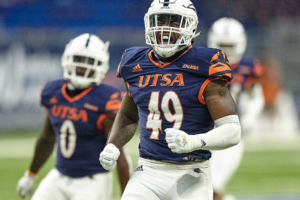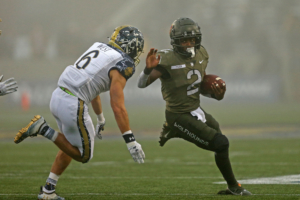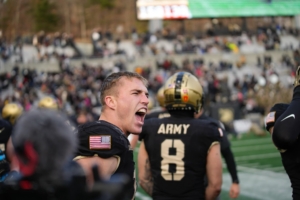It is an understatement to say that 2020 has been less than stellar so far. We saw spring sports, summer plans, graduations, and life in general come to a grinding halt or get cancelled all together. Like many of you, my fear is that the grim reaper of COVID is coming for our most hallowed and beloved national institution, College Football.
Even if they play, the season will no doubt look quite a bit different. From masks to distancing to decreased capacity, college football this year will look strange and unusual, very unlike it did less than a year ago. But I’m still holding out hope that the season will play on with at last some fans in attendance. Assuming this is true, game days at places like West Point, Tuscaloosa, Ann Arbor, and Oxford will have to adapt. Here are some ideas for colleges to try as they attempt to salvage the game day experience and keep fans engaged. This is obviously not a complete plan, nor has it been evaluated by genuine government health officials, so please do not angry tweet me… unless you really, really want to.
The 47-month experience starts now.#GoArmy pic.twitter.com/GKoeELFkF9
— Army Football (@ArmyWP_Football) July 12, 2020
Okay, let’s get started.
For argument’s sake, let’s assume that colleges are able to play a full 12 game schedule. That’s a lofty goal at this point, but we’re going with it. Let’s also assume that there are six home games, and that season ticket holders will only be able to attend three due to decreased capacities in the stadium.
So. If I’m a season ticket holder, you’d better believe that I am going to make every effort to be at my three games. Hell, even if I’m just a diehard fan, I may still travel to my school’s location for the games to which I don’t have tickets just to continue the tradition and tailgate next to the stadium. The university should do everything they can to accommodate both groups of people.
Local bars and hotspots may be shut down due to COVID or the economy, and traditional game day activities may be canceled. Universities should therefore host official tailgates to accommodate those that have made the trek to the game. The tailgate can have the band and cheerleaders, alumni relations, team colors, and food and drink. If we wanted to get real creative, we could even get local businesses to help cater these tailgates, thus helping the local economy rebound. Fans wanting something to do can buy a ticket to the tailgate and spend the pre-game there, while those that have their own tailgate traditions can do their own thing. Also, if you live in a college town and want something to do, for a small fee you can attend the pre-game festivities and stick around while the game is televised at the tailgate location. This encourages people to travel to the game even if they can’t get into the stadium which in turn helps the local economy, ie. hotel rooms, restaurants, etc.
The boys are back in town!#GoArmy pic.twitter.com/5ytMYlcM4n
— Army Football (@ArmyWP_Football) July 10, 2020
However, it may not be feasible for some people to travel to a game they cannot attend. Whether dueto travel restrictions, overall imposition, or a simple lack of desire, some fans and season ticket holders will spend the 2020 season on their couches. In order to better accommodate those fans, the schools should coordinate events in alumni hot spots. Just like Army-Navy watch parties, local alumni associations will no doubt gather to watch the game.
One idea would be for schools to partner with the local associations and/or businesses to host watch parties. For example, Army could partner with Mission Barbeque to rent out the restaurant, bring in TVs, and host watch parties for alumni in 10 cities. Bigger schools could partner with places like Buffalo Wild Wings to host events in 20 or 30 cities. Similar to the tailgate at the school, attendees will pay a fee and get access to food, drinks, and the game. Granted, all of this will require social distancing considerations and maybe even total attendance restrictions, but it at least gives fans something. Plus, depending on the level of coordination, schools could send spirit packages to liven up the venue, or sell T-shirts for each game. The possibilities are almost endless and allow for local alumni associations to do their own thing while still partnering with the school for a cohesive game day experiece.
New cadets are continuing to roll in!
More than 1,200 U.S. citizens and 13 international students, including 286 women, 493 minorities and 18 combat veterans will report to #WestPoint July 12-14 on #RDay to join #USMA2024. pic.twitter.com/9q79sTLxdU
— U.S. Military Academy at West Point (@WestPoint_USMA) July 12, 2020
But what about those cities that are full of alumni and die-hard fans? We all know that a lot of USMA grads end up in Texas. With the way things are
going, these fans may not be able to travel to New York to see any Army games!
For argument’s sake, let’s say that 1,000 people are gathering for a tailgate/watch party in Dallas. They have rented an outdoor venue (obviously) and are ready to cheer on the Brave Old Army team. This is a golden opportunity for the Army Athletics Department and Alumni Association. Not only can they partner with the event organizers to coordinate details and send spirit items, they could potentially send someone to the tailgate. Whether it is a local field force representative or someone from the school hops on a plane, having someone in person to represent the school officially would go a long way. Also, this would be a great opportunity to remind people to donate money and stay in contact. If someone is in attendance at the tailgate and did not have to spend $1,000+ to fly their family to New York for a game, they may be more inclined to make a charitable and tax deductible donation.
Obviously, these ideas won’t solve all of the problems facing college football this season. In some ways they would just create more headaches for schools already feeling the pressure of budget cuts and uncertainty. However, for some these ideas could help unite the alumni base and build team spirit at a time when the country as whole desperately needs it.
College football will never look like it did in 2019. From schools closing their programs to potential conference realignments, we are living in the future. Like it or not, we must embrace this reality. Schools that take the initiative to continue to engage their alumni and find alternatives for on-site game day activities will be significantly better off than those who fail to adapt.
Oh yeah, Go Army! Beat Navy!!!










